JEDDAH: Saudi food exports will become a major non-oil industry over the next five years, according to Prince Abdul Aziz bin Nawaf bin Abdul Aziz, who inaugurated the four-day 6th Foodex Saudi 2018 at the Jeddah Center for Forums and Events on Monday.
During the opening of the largest Saudi international exhibition specializing in the food sector, the prince emphasized the importance of concerted efforts and international partnerships to achieve agricultural development and sustainable food security.
He said the participation of 52 countries represented by 500 international brands reflected the position that Saudi Arabia occupied economically. “It also shows the leading role played by the Kingdom in the Middle East as the largest and most attractive market for all investors,” he said.
The prince said the achievements of food and beverage industries in Saudi Arabia during the first quarter of the current year had reached 82 percent and total funding had increased by 217 percent, according to information issued by the Ministry of Energy, Industry and Mineral Resources. This also revealed that total Saudi exports in the food sector during the past year amounted to SR14 billion for 2017, and the sector ranked fourth in the list of major non-oil exporting industries.
Haya Al-Sunaidi, chairwoman and CEO of Reed Sunaidi Exhibition, organizer of the exhibition, told Arab News that the launch of Foodex Saudi had seen wide participation from international brands, including the latest products in fresh, chilled and frozen foods, dairy products, food services, canned goods, meat, poultry, snacks and sweets.
“This year, we have more exhibitors than those in the last edition or any previous edition of the exhibition. We have both public and private participants,” she said.
“The government has been encouraging farmers to produce organic products. Now we can see that we are producing olive oil, a thing that I had not imagined we could really have,” she said. She added that Saudi Arabia was now exporting dates, poultry and dairy products.
However, Al-Sunaidi said Saudi Arabia was still importing 80 percent of its total food consumption, which is why she believes imported brands will not affect homegrown food production.
Organic food products were noticeably present at the exhibition, proving that Saudis are reconsidering their eating habits. Al-Sunaidi said that Saudi investors and consumers are demanding more organic food products.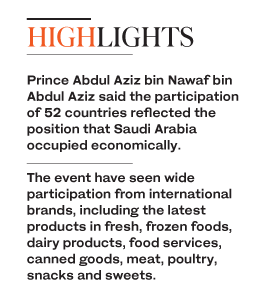
Al-Sunaidi said the exhibition, which is seeing European and Asian participation, offers business networking opportunities for industry professionals working in the food and beverage sector. She added that it is also showcasing new food products entering the Saudi market for the first time.
Al-Sunaidi said that leading local, regional and international companies trust the Saudi market. “Saudi Arabia has the largest food market in both the GCC countries and the Middle East. It is also one of the world’s strongest economic and consumer powers,” she said.
“Food and beverage imports are expected to increase up to SR135 billion in 2020 compared to the present rate of SR80 billion. In addition, fast-food market volume exceeds SR5 billion per year and retail sales have surged by 66 percent,” she said.
Meanwhile, general manager of a Kenyan tea company, Naveed Ariff, told Arab News that the Kenyan tea they are promoting at the exhibition is the finest tea in the world. “Unlike any other tea elsewhere, our tea production is always fresh throughout the year, the quality is incomparable and the price is reasonable,” he said.
The Saudi Food and Drug Authority (SFDA) was also present at the exhibition through its booth, which spread its awareness messages to visitors on the latest food security standards aimed at protecting consumers’ health.
The winners of nine awards for food industry innovators will be announced at the exhibition.
Thomas A. Gugler, the president of the World Association of Chefs’ Societies, has announced receiving the nominations for best cold drink, best hot drink, best dairy product, best product in red meat and chicken, best product in the bakery and confectionery sector, best product in the spices and sauces sector, best frozen or cold food product, best organic food product and best healthy food product.
He said the selected candidates were highlighted to visitors, specialists and pioneers of the food industry, and they were assigned a place inside the suite dedicated to the competition at the exhibition.
In contrast, the world’s most famous chefs are competing at the “Salon Culinaire,” held under the auspices of the World Association of Chefs’ Societies and the Saudi Chefs’ Table, during which 200 chefs from the world’s most famous hotels and restaurants compete in 17 categories.
Foodex Saudi promotes Kingdom’s agriculture
Foodex Saudi promotes Kingdom’s agriculture

- The government has been encouraging farmers to produce organic products
- Organic food products were noticeably present at the exhibition, proving that Saudis are reconsidering their eating habits
How honeybees drive biodiversity and strengthen ecosystems in Saudi Arabia and beyond

- By protecting honeybees, the Imam Turki bin Abdullah Royal Reserve provides a boost for the sustainable honey industry
- This keystone species, essential for sustaining life on Earth, faces threats from climate change, habitat loss, pesticides, and disease
RIYADH: Beyond the manufacture of honey, honeybees are also guardians of biodiversity and strong ecosystems. As a keystone species, they support plant diversity by pollinating wildflowers and provide a welcome boost to agricultural productivity.
Although small in size, without these precious insects, cascading effects could destabilize entire food chains and habitats for countless organisms.
Recognizing their importance, Saudi Arabia has undertaken active conservation efforts, demonstrating the Kingdom’s commitment to sustainable beekeeping and the protection of these industrious insects.

Together with other pollinators such as birds and bats, bees are vital to global agriculture, contributing to 35 percent of the world’s crop production by pollinating 87 of 115 leading food crops, according to the Food and Agriculture Organization.
Honeybees help to maintain plant diversity by pollinating a wide range of species, preventing any single plant from dominating. This balance is crucial for ecosystem resilience, enabling them to better withstand environmental challenges such as climate change and invasive species.
Wildflowers, which rely heavily on honeybees for reproduction, play a key role in this balance. These flowers provide food and shelter for birds, insects and small mammals, creating a ripple effect that supports a diverse array of species throughout the ecosystem.
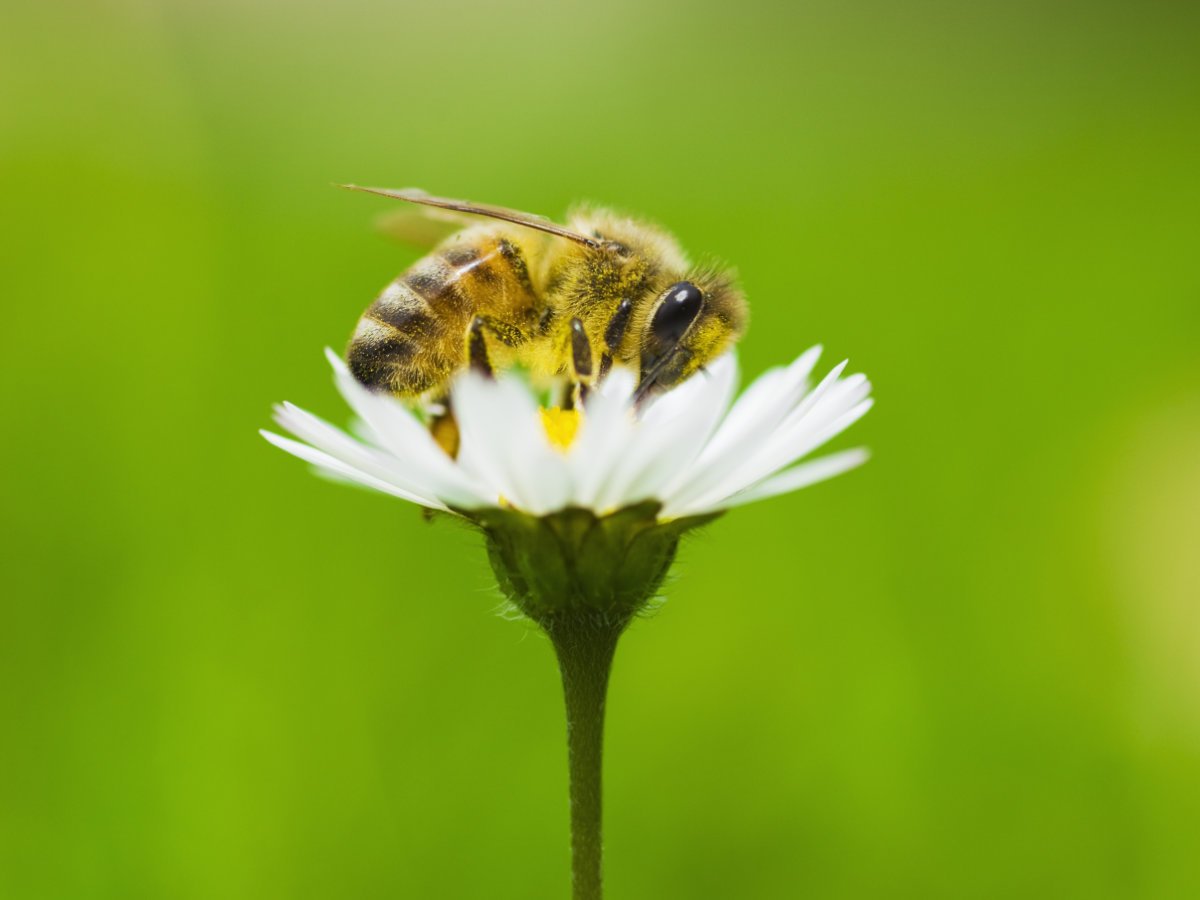
In Saudi Arabia, the Imam Turki bin Abdullah Royal Reserve hosts 25,737 beehives across 256 sites, fostering honeybee populations in a thriving and protected environment.
“The reserve provides a naturally protected environment rich in flowering plants, which serve as a primary source of nectar and pollen,” Abdulmajeed Al-Dhaban, a spokesperson for the reserve’s development authority, told Arab News.
“This ideal ecosystem enables bees to produce large quantities of high-quality honey, as well as other hive products like beeswax and royal jelly, which hold significant nutritional and economic value.”
Opinion
This section contains relevant reference points, placed in (Opinion field)
Thanks in part to the bees’ services, the reserve plays a vital role in enhancing the Kingdom’s food security.
“In addition to honey production, the reserve’s diverse ecosystem sustains natural pollination cycles,” Al-Dhaban said.
“This contributes to the productivity and quality of nearby cultivated crops and aligns with Saudi Arabia’s national efforts to achieve food security and self-sufficiency.”

Noting that pollination has a critical impact on the global food system, Al-Dhaban said bees are among the most efficient agents for transferring pollen between plants.
“This process not only enhances seed quality and density but also boosts agricultural crop production in terms of both quantity and quality,” he said. “Bee activity contributes directly to the production of honey, a valuable food product with significant health and economic benefits.”
Al-Dhaban also emphasized that honeybees are crucial for supporting food security and ensuring the long-term sustainability of natural resources.
This is particularly important as the reserve’s biodiversity creates an ideal environment for key Saudi crops, including acacia, Sidr trees and caper shrubs.
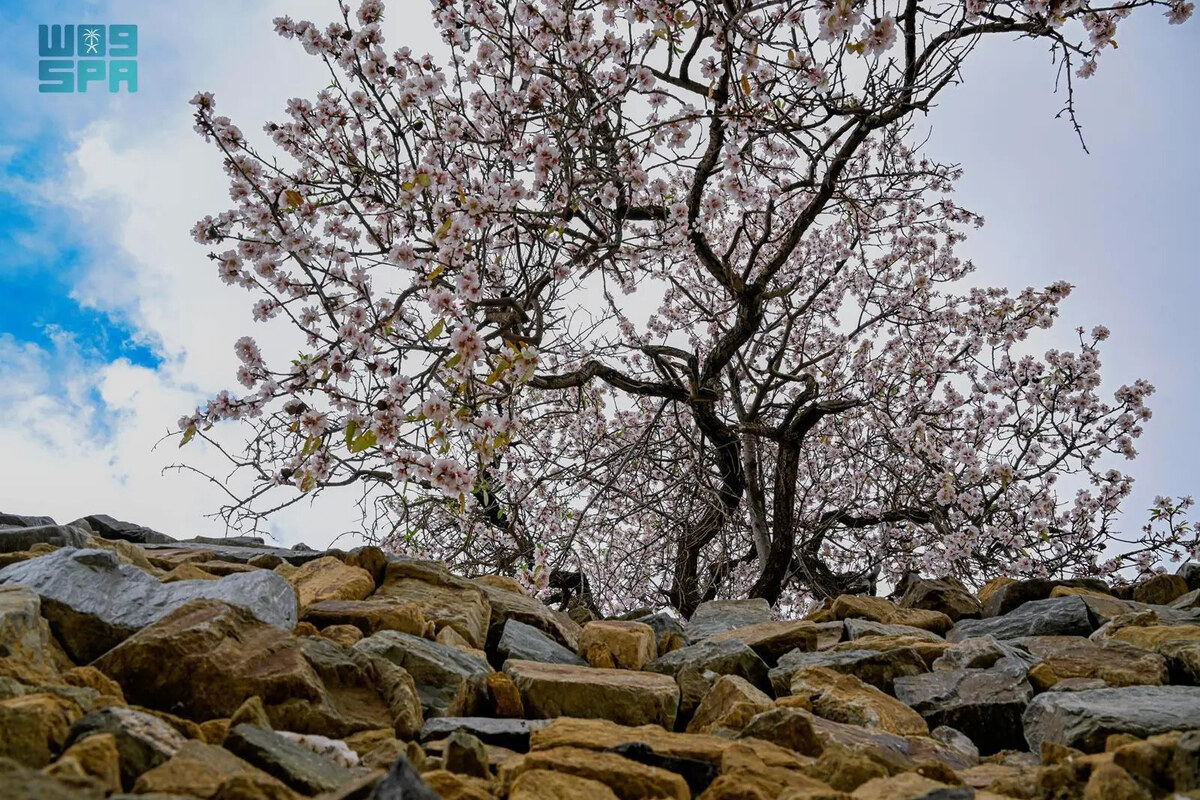
These plants benefit directly from bee pollination, which also increases the production of high-quality nectar for honey and other hive products. This natural cycle, Al-Dhaban said, supports local food supplies and strengthens the regional economy.
“By reducing reliance on imports and promoting local honey production, the reserve positions Saudi Arabia as a leader in sustainable honey sector development,” he said.
However, honeybee populations face serious threats, including climate change, habitat loss, pesticide use and disease.
To tackle this challenge, Mefleh Al-Jabreen, a beekeeper and owner of mobile apiaries at the Imam Turki bin Abdullah Royal Reserve, highlights the importance of selecting bee breeds that balance honey production and reproduction.
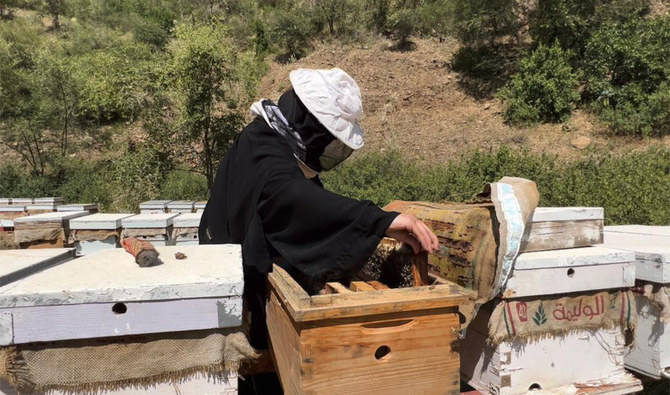
He told Arab News that his bees are transported to pastures rich in wild flowering trees, providing them with abundant nectar and pollen.
“We extract a specific amount of honey during gathering periods, leaving enough for the bees to sustain their hives,” he said.
Al-Jabreen explained that these sustainable practices help to maintain healthy honeybee populations while ensuring high-quality production.
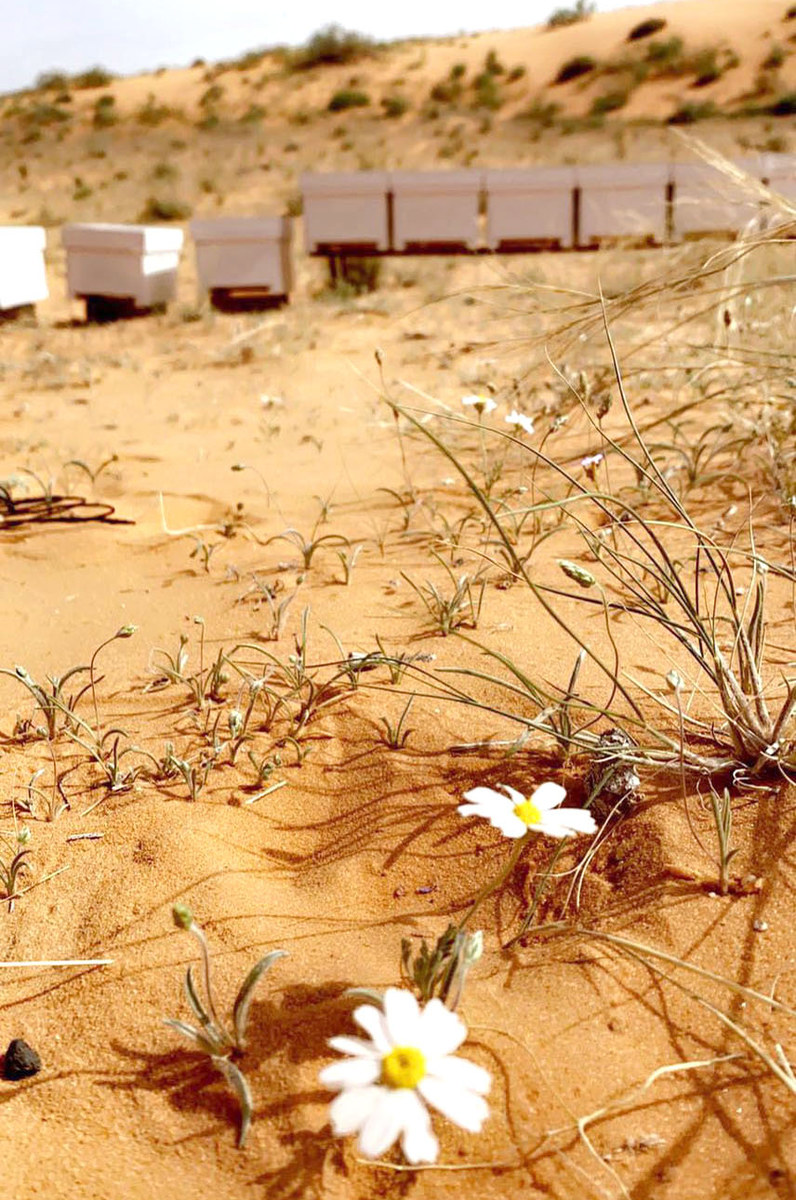
The reserve’s botanical diversity also supports the production of more than seven varieties of wild honey, many of which have earned international recognition for their quality.
Al-Jabreen also noted that the health of a hive largely depends on the queen bee. “A young, active queen laying eggs abundantly forms the foundation of a stable hive,” he said.
DID YOU KNOW?
• Crops, such as almonds and vanilla, are almost entirely dependent on honeybee pollination.
• Honeybee pollination prevents any single plant species from dominating, maintaining ecosystem balance.
• A young, active queen laying eggs abundantly forms the foundation of a stable hive.
He added that it is also crucial to monitor the number of worker bees and ensure the hive remains free of diseases and parasites, which can threaten colony stability and productivity.
Environmental challenges, such as extreme temperatures and unpredictable weather, pose significant threats to honeybee health, disrupting key hive processes such as honey production and reproduction.
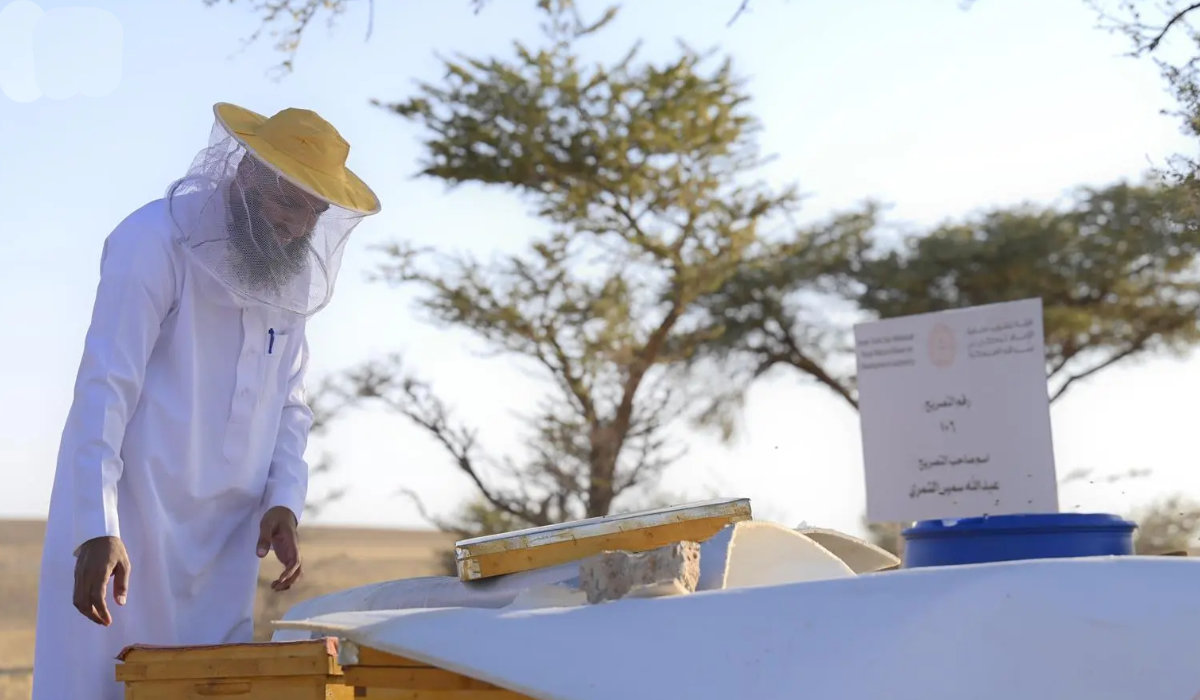
Al-Jabreen said that several factors must be considered when addressing these challenges: “These strategies include hive insulation, which helps reduce heat stress in extreme temperatures.”
Meanwhile, tree cover and shaded areas protect hives from direct sunlight during hot weather, while relocating hives to coastal regions in winter helps to keep bees active and productive.
“Windbreakers and hive relocation shield honeybees from strong winds and cold climates,” he added.
Al-Jabreen emphasized that plant diversity is essential for the survival of honeybees. “Bees are a vital part of the interconnected ecosystem, and their well-being depends on an abundance of floral and crop resources,” he said.
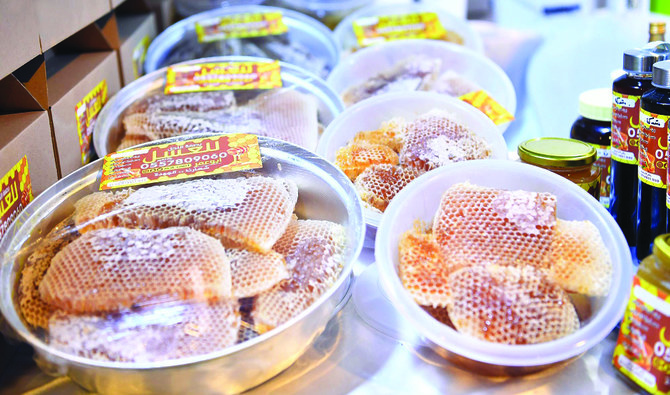
Recent innovations in beekeeping are helping to protect honeybee populations and enhance hive productivity. Al-Jabreen highlighted several key advances, such as special pollen-collecting boxes and bee breeds adapted to local climates.
He also hailed the growing collaboration between beekeepers and farmers. Organic farming practices, which avoid harmful chemicals, create safer environments for bees to thrive.
“We work with farmers to coordinate pesticide spraying schedules and relocate hives to safer areas,” Al-Jabreen said.
With growing threats to honeybee populations, governments, researchers and communities must prioritize their protection. Safeguarding these vital pollinators is key to ensuring a sustainable future for ecosystems, agriculture, and global food security.

The Bedouin’s best friend: Saudi saluki center works to preserve at-risk breed

- The Arabian saluki dates back 5,000 years but faces the threat of extinction due to crossbreeding, the loss of traditional desert habitats and lifestyle changes in region
- International Aseel Arabian Saluki Center aims to raise awareness of breeding standards and offers support for owners, including training and veterinary services
RIYADH: The Arabian saluki, which is believed to have originated in the Middle East, is one of the oldest purebred dogs in the world. It has been a loyal companion to Bedouin peoples dating back at least 5,000 years.
Now, however, it faces the threat of extinction as a result of crossbreeding but the International Aseel Arabian Saluki Center in Saudi Arabia is working hard to ensure it survives.
Unlike some breeds that rely primarily on sense of smell for hunting, salukis are sighthounds, meaning they visually identify prey. Known for their agility, intelligence and an impressive ability to take down prey, salukis long served Arab Bedouin tribes as hunters.
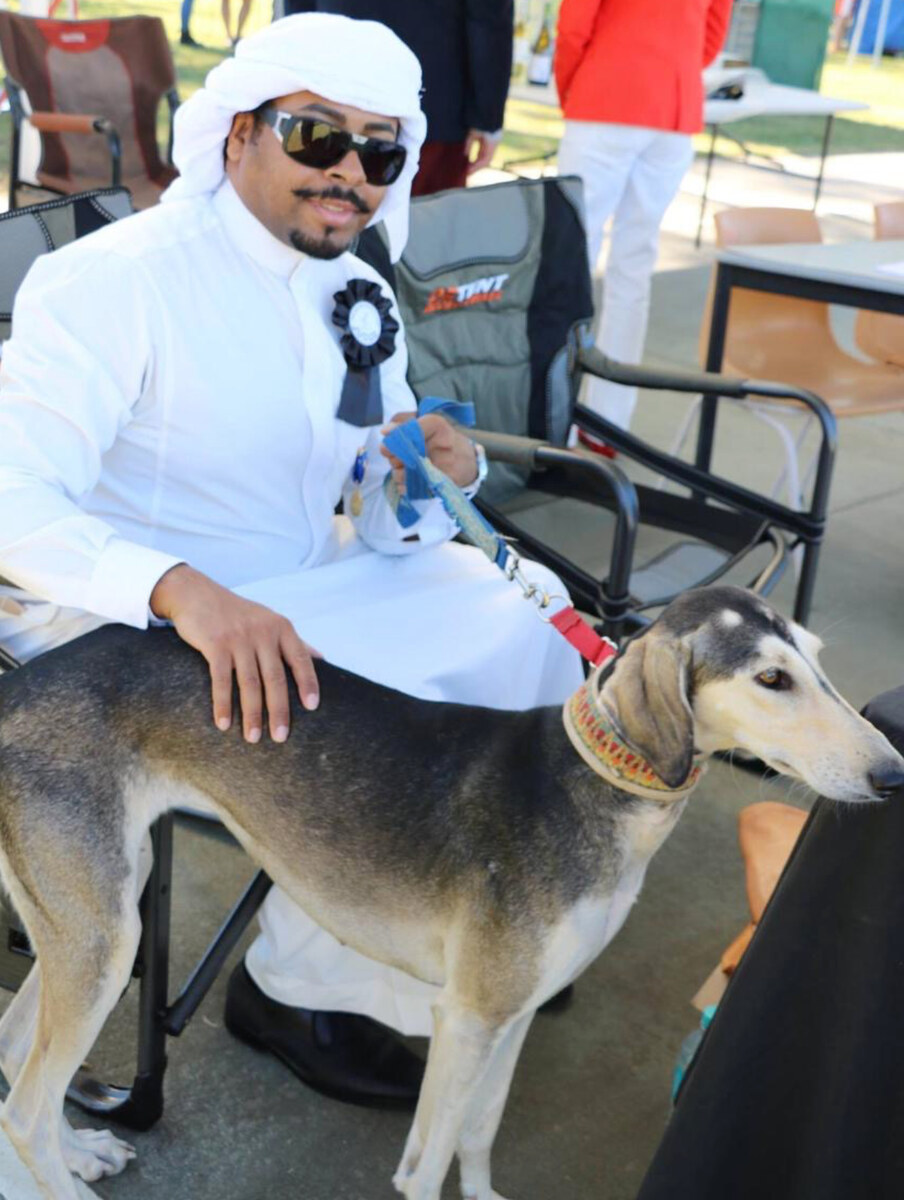
Fahad Al-Farhan, the president of the IAASC, explained the significance of the saluki to the region.
Arabian salukis are “deeply rooted in our culture and one of our main symbols of our national identity with falcons, Arabian horses and camels,” Al-Farhan told Arab News.
“The Arabian saluki and the traditional way of hunting is a vital part of Arabian culture and heritage.
FASTFACT
The Arabian saluki dates back 5,000 years but faces the threat of extinction due to crossbreeding, the loss of traditional desert habitats and lifestyle changes in region.
“In the old days, salukis were indispensable hunting companions, securing the existence of many of the Bedouin families.
“They are graceful and fast and they distinguish themselves with their endurance.”
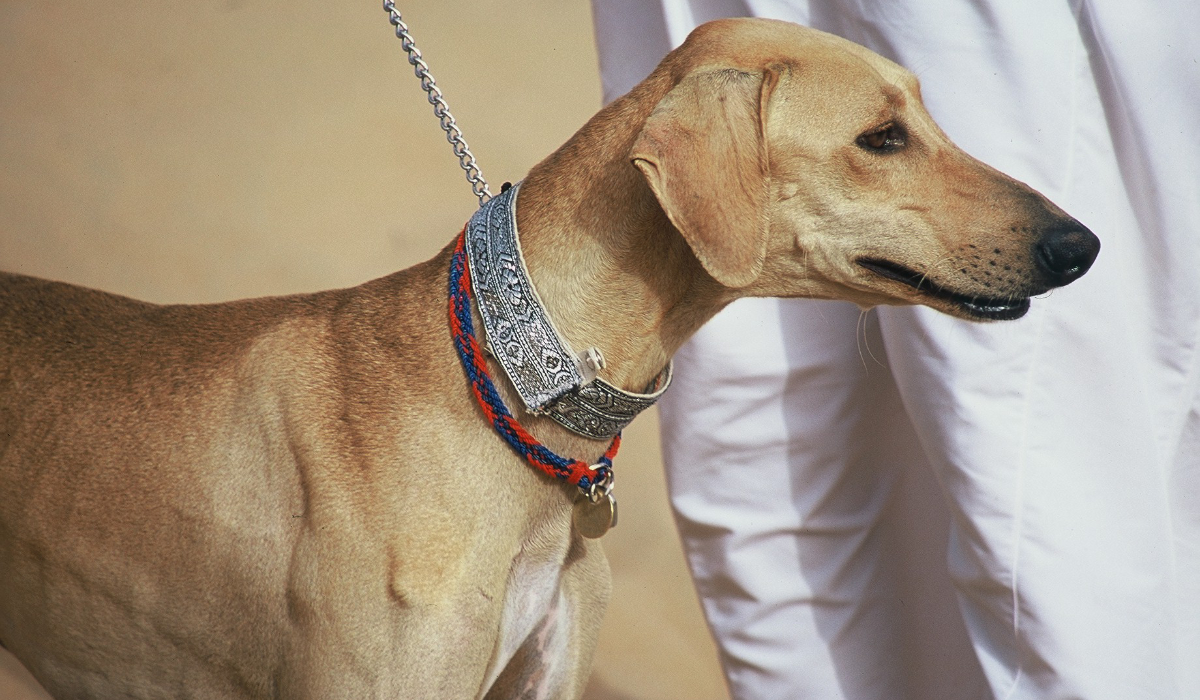
He noted the loyalty of the breed, quoting a proverb that states: “Only the owner sees the true face of a saluki.”
The animals are very attached to their families and loyal to their masters, said Al-Farhan, who is also president of the World Aseel Arabian Saluki Organization and the Saudi Kennel Club Union.
“Although the Arabian salukis are natural born hunters, they are calm and even-tempered representatives of their species,” he added.
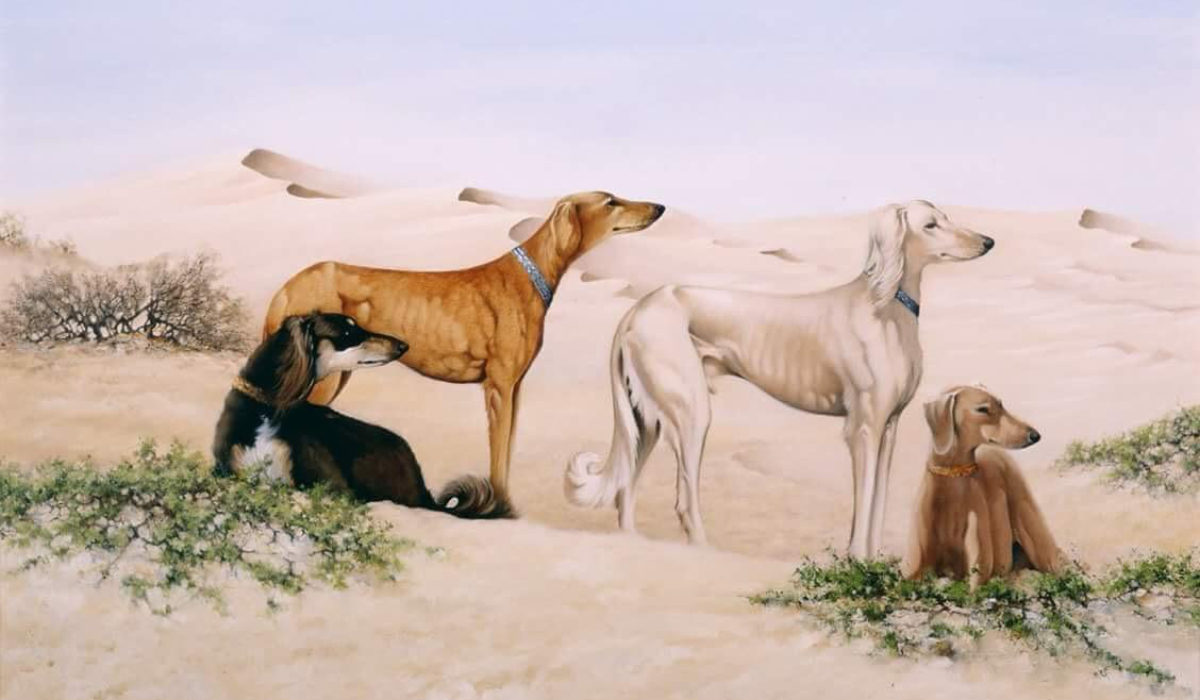
“They are also very curious and you even get the impression that they have a great sense of humor.”
However, the rapid economic growth of the region in the modern era has endangered the natural desert environments that were the traditional habitats not only of the saluki but other Arabian species including falcons, horses and camels, he warned.
“The deserts and Arab lifestyles that created the circumstances in which the Arabian horse, camels and the saluki flourished now no longer exist,” Al-Farhan said
“As a part of the cultural heritage of Arabian hunting, Bedouins have been breeding Arabian salukis for thousands of years (but) the saluki may be lost to our future generations unless steps are taken to preserve it.”
The Arabian Aseel Saluki Center in Saudi Arabia has a long list of members that includes saluki owners abroad, Al-Farhan added, and it works to raise public awareness of breeding standards.
It offers veterinary services worldwide, including health checks and vaccinations, health certificates, micro-chipping and DNA testing, together with advice about grooming and travel arrangements for owners moving their dogs to another country.
Al-Farhan said that the IAASC is working to register the Arabian saluki on UNESCO’s Intangible Cultural Heritage List, which recognizes and helps to preserve endangered cultural traditions and practices.
“We believe that the inscription of the Arabian saluki hound of Arabia (on the UNESCO lists) will promote the visibility of its heritage locally and worldwide,” he added.
Desert truffles: Saudi Arabia’s buried treasure

- Truffles offer various benefits beyond their culinary value. Their water is traditionally believed to have medicinal properties for eye ailments, based on a saying attributed to the Prophet Muhammad
QASSIM: A prized wild fungus found under the desert sands is popping up at markets across the Kingdom as Saudi Arabia’s truffle season is in full swing.
The central region of Qassim is a leading center for the cultivation of the desert truffle, known by its scientific name Terfeziaceae, or in Arabic as fage, as reported by the Saudi Press Agency.

Several natural environmental factors contribute to the area’s proliferation of truffles, including fertile soil, untouched land, access to fresh water, climate, and the presence of the sunrose or raqrooq plant, particularly in the northern Qassim areas of Shari and Al-Sa’ira.
Local farmer Abdulkarim Saleh Al-Rasheed harvests truffles found near the sunrose plant thriving in lowlands adjacent to wheat fields irrigated by overflowing pivot sprinklers.

He said that the emergence of truffles had coincided with the cessation of thunderstorms accompanied by lightning, a phenomenon traditionally linked to truffle growth.
Al-Rasheed told SPA that successful cultivation depended on irrigation timing, water salinity, soil fertility and temperature, each playing a crucial role.
For truffles, the optimal temperature is measured ten days after the typically mild “Wasm” season beginning in mid-October.
In northern Qassim, this translates to nighttime temperatures between 15 and 20 degrees Celsius.
Irrigation typically begins around Sept. 25 in areas where the sunrose plant is present, with truffles beginning to appear about 50 days later.
He added that cultivated truffles in northern Qassim typically begin to appear around Nov. 20.
Truffles offer various benefits beyond their culinary value. Their water is traditionally believed to have medicinal properties for eye ailments, based on a saying attributed to the Prophet Muhammad. They also serve as a natural food source for grazing animals.
The Qassim Truffle Festival, currently in its fourth year, is a marker of the region’s truffle production.
The ten-day festival features 18 booths showcasing truffles, a dedicated auction area, 32 booths for local producers, and other exhibits featuring dates, honey, food products, and related activities.
Poetry in spotlight at Jazan forum

- This year’s forum featured the participation of over 25 poets representing various poetic schools
JAZAN: The Sixth Poetry Forum was launched at the Jazan Literary Club on Thursday. The event forms part of the Jazan Winter Season 2025 and was held at the Grand Millennium Gizan Hotel. Yahya Al-Ghazwani, the secretary of the Jazan region and general supervisor of the winter festival, attended the event.
Hassan Al-Salhabi, the club’s president, spoke of the forum’s success over the past five years, which has boasted the participation of more than 200 poets.

He also mentioned the honoring of several literary figures in the Kingdom and the presentation of specialized critical studies on prominent poets.
This year’s forum, which ran for two days, featured the participation of over 25 poets representing various poetic schools, further enriching the cultural movement on the local literary map.
The opening included an artistic performance titled “Inspiration of Mirrors,” and the honoring of several participating writers and poets.
Two poetry sessions were held on the first day of the forum, featuring 10 poets who presented a variety of works in front of a large audience.
Saudi Arabia takes up position as secretariat of global coral reef body

- Coral reefs sustain 25 percent of the world’s marine biodiversity and generate an estimated $9.9 trillion annually in ecosystem services
JEDDAH: Saudi Arabia on Friday officially assumed its position as secretariat of the International Coral Reef Initiative, an organization that works to protect the planet’s coral reefs.
Representing 102 members and 45 countries responsible for 75 percent of the world’s reefs, ICRI plays a role in tackling environmental and economic challenges facing these vital ecosystems.
The virtual handover ceremony was attended by international representatives, including Peter Thomson, the UN’s special envoy for the ocean, as well as representatives from organizations such as the International Union for Conservation of Nature and the US State Department.
The Kingdom’s tenure as head of the body was confirmed during the ICRI’s 38th General Meeting in September 2024 and will be led by the Kingdom’s General Organization for the Conservation of Coral Reefs and Turtles in the Red Sea, also known as SHAMS.
“Saudi Arabia’s role as ICRI secretariat underscores our unwavering commitment to a sustainable future for coral reefs worldwide,” said Dr. Khaled Asfahani, CEO of SHAMS and chair of ICRI. “Through science, innovation, and collaboration, we aim to protect these vital ecosystems, ensuring their resilience for future generations while maintaining their invaluable contributions to the global economy.”
Coral reefs sustain 25 percent of the world’s marine biodiversity and generate an estimated $9.9 trillion annually in ecosystem services, from fisheries to tourism.
Yet, they are under siege from climate change, pollution, and overfishing. With Saudi Arabia at the helm, ICRI will craft its 2025–2027 Action Plan to address these threats.
The plan seeks to expand membership to include countries representing 90 percent of global coral reefs, strengthen regional collaborations in the Red Sea, South Asia, and East Africa, and integrate reef resilience into global biodiversity policies.




















